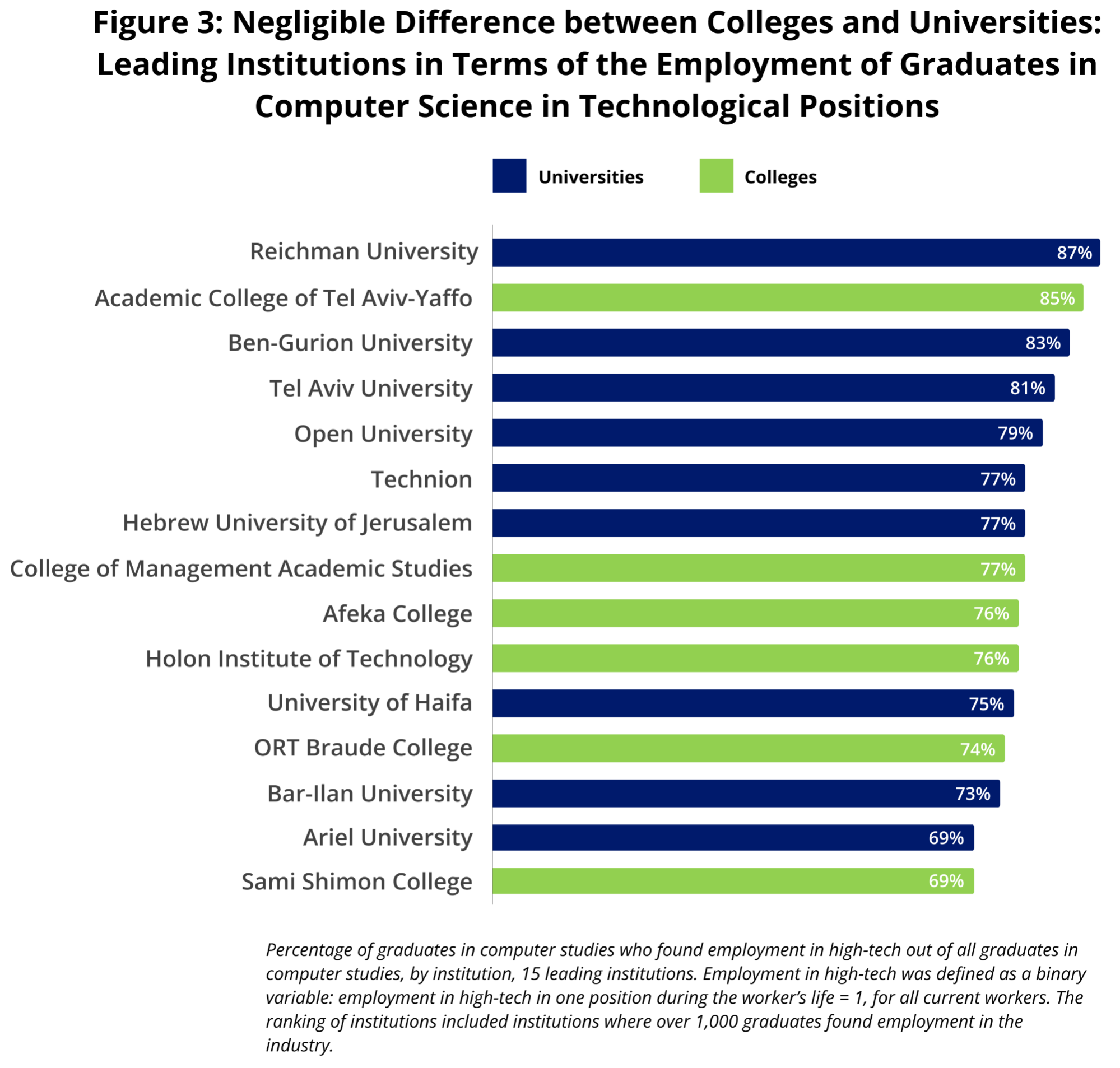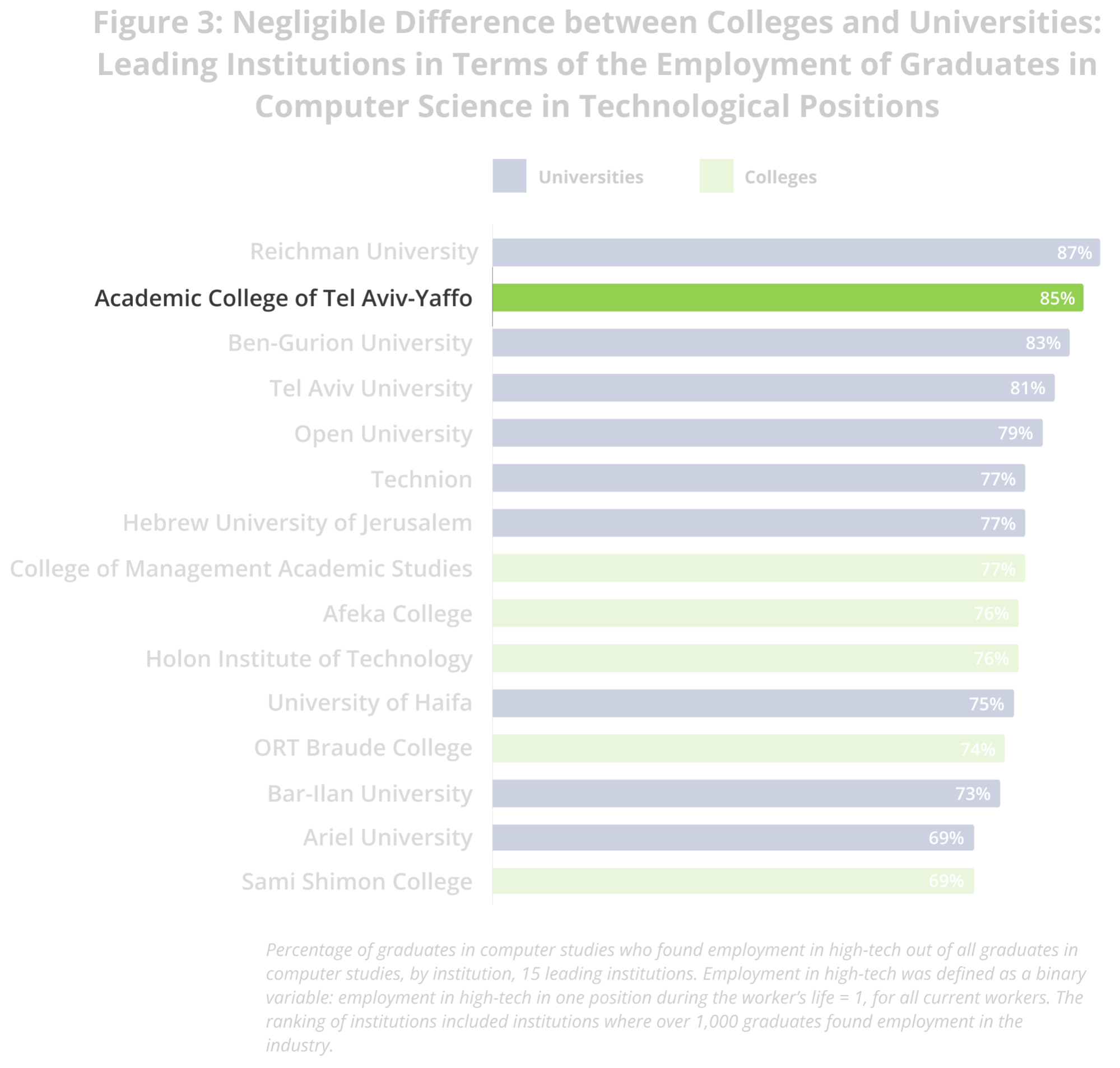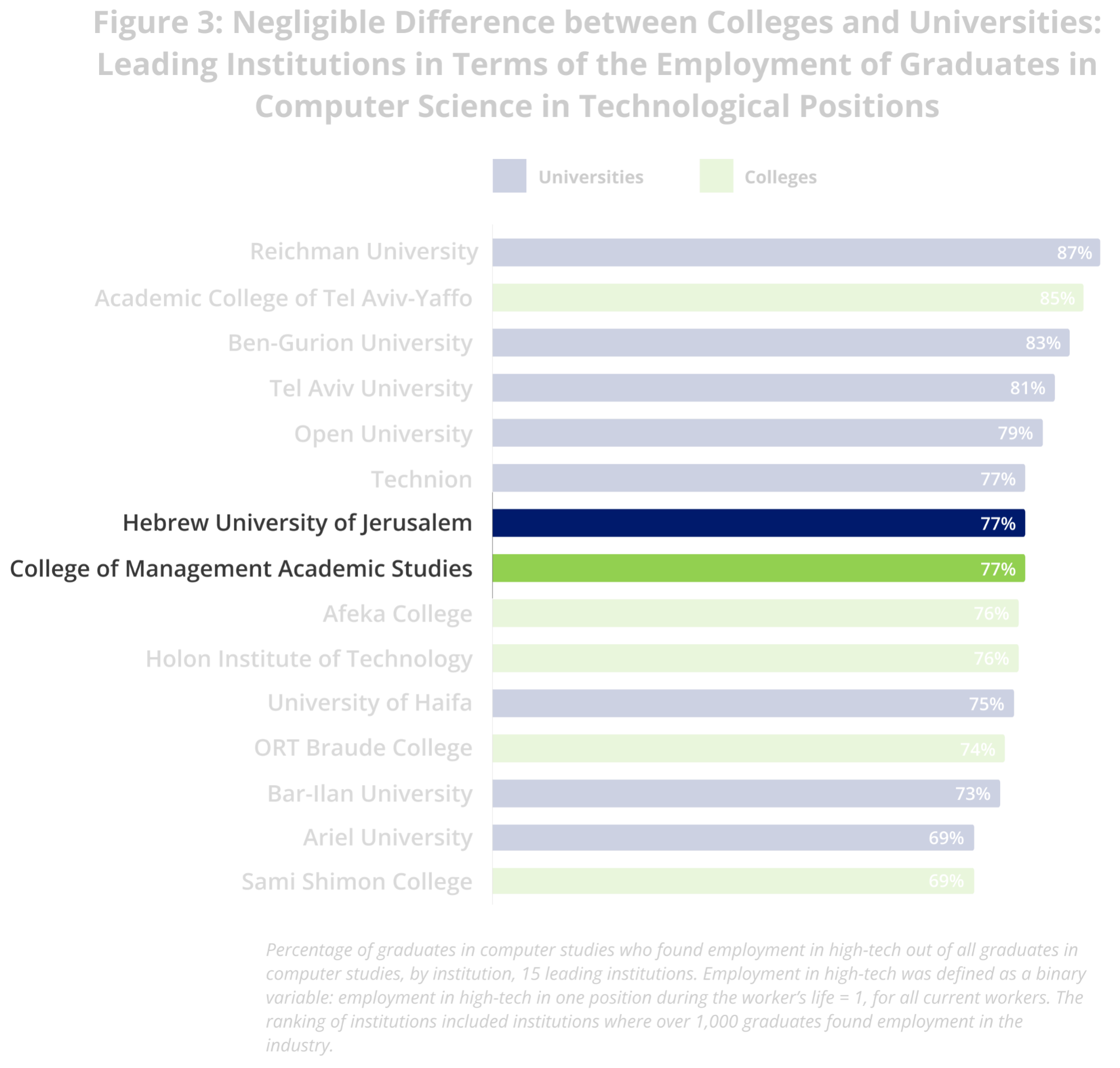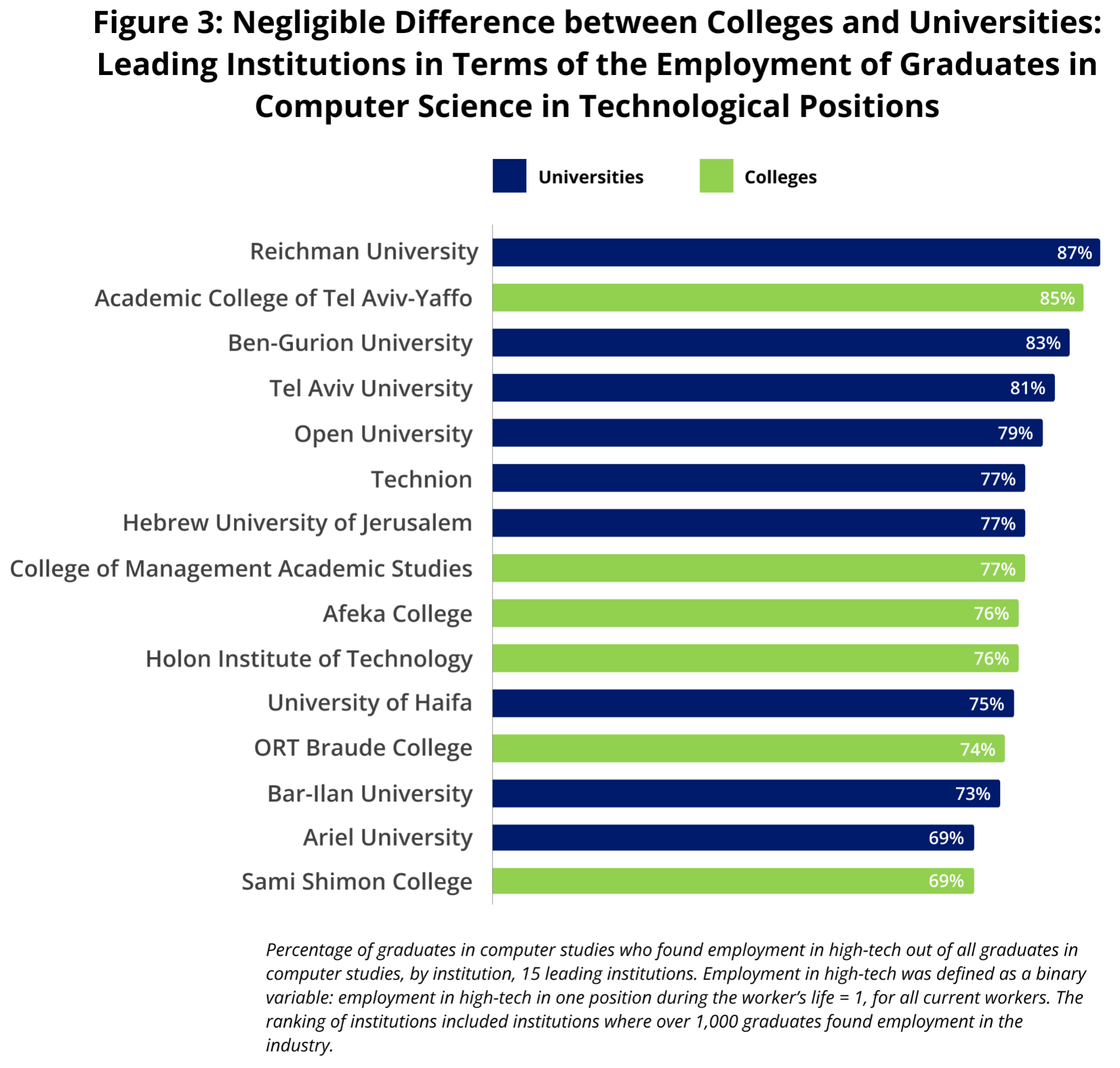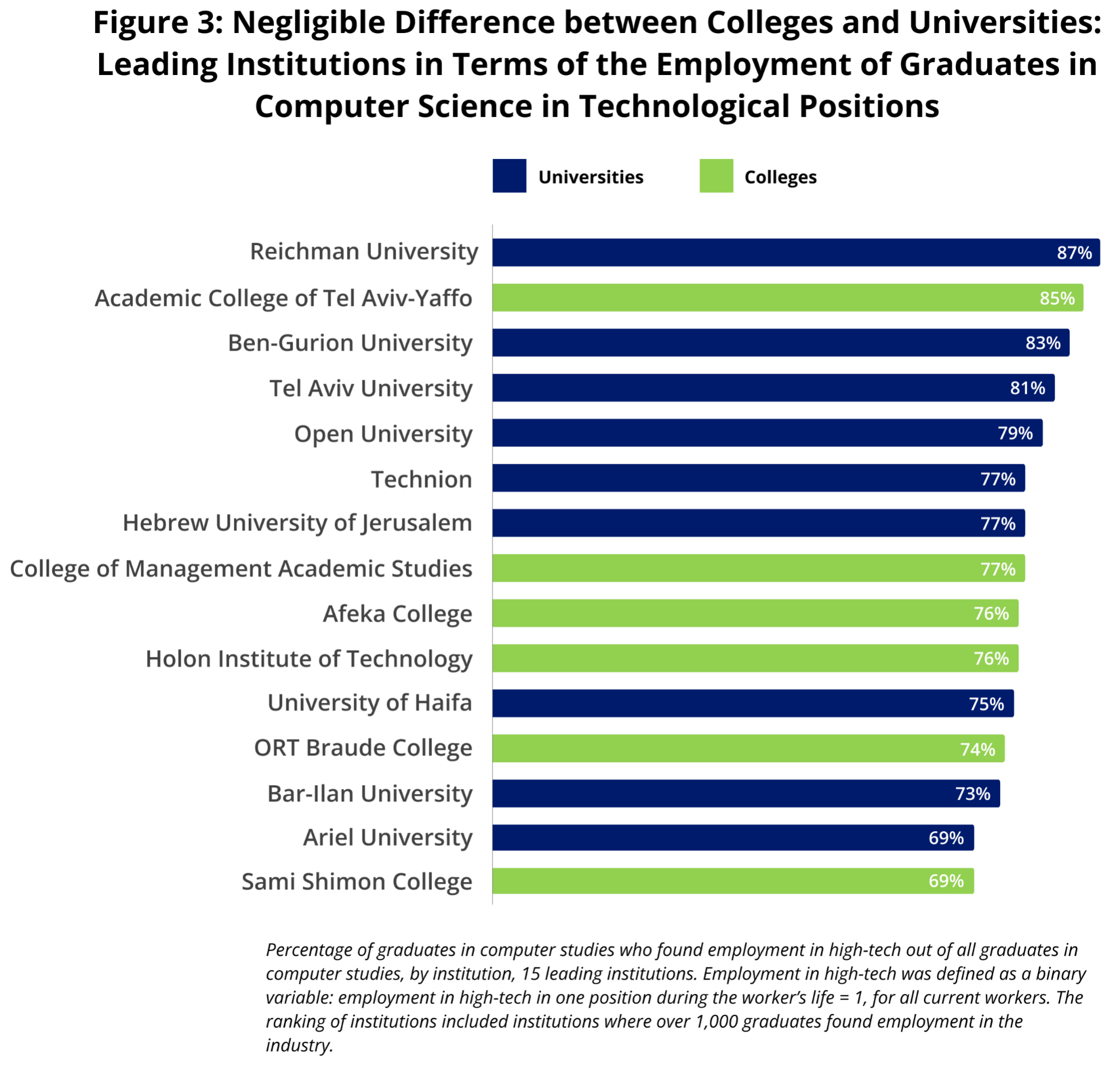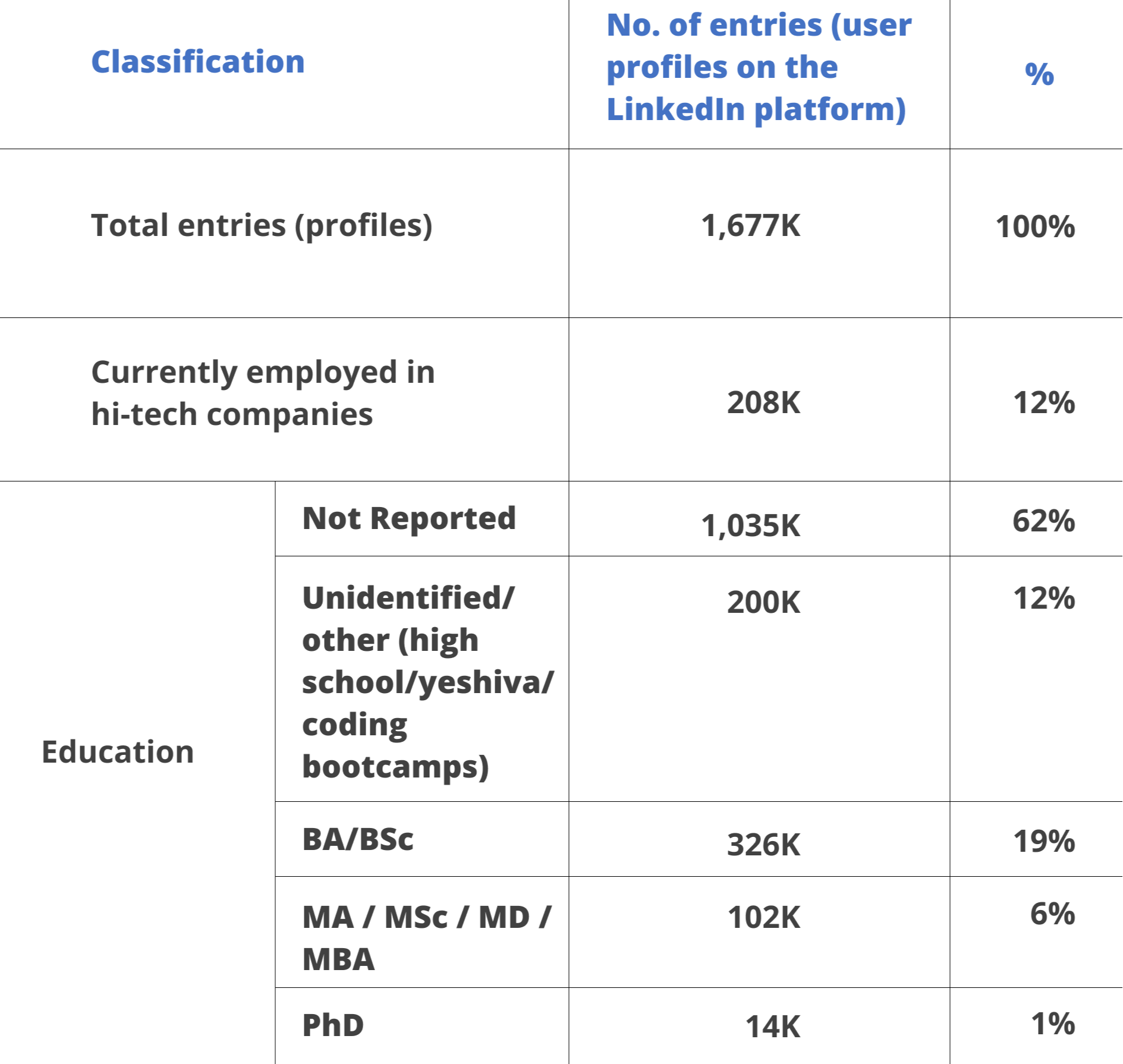The main entry point to the high-tech industry continues to be computer studies. In fact, 72% of individuals with a degree in computer studies eventually join high-tech companies at some point in their career.
Powered by

Insights from an analysis of the educational and employment data of all LinkedIn users employed in Israel
February 2023
Research and writing: Aaron Gefen, Assaf Patir, Ziv Barel, Ido Meiboom
The main entry point to the high-tech industry continues to be computer studies. In fact, 72% of individuals with a degree in computer studies eventually join high-tech companies at some point in their career.
47% of high-tech employees have no background in computer studies. Instead, 18% have other engineering or scientific qualifications, and one-third have no technological training whatsoever.
College graduates integrate into high-tech at high rates. Among those with a computer studies degree, there is a small gap in favour of universities in terms of integration rates: 78% in universities versus 69% in colleges. However, the variance between the groups is small compared to the variance within the groups, as there are colleges with higher integration rates than most universities.
Coding bootcamps are becoming increasingly popular as an additional form of high-tech training. In fact, the rate of graduates who successfully land technological roles in high-tech has risen steadily from a mere 3% in 2005 to 13% in 2019. Presently, 9% of all Israeli high-tech employees are graduates of these programs.
Nearly half (46%) of coding bootcamp graduates also have an academic degree. Among this group, 20% have previously undergone training in computer studies (using the additional training as a practical supplement), 12% have a scientific or engineering background outside of computer studies, and the remaining 68% have an academic background in a field unrelated to technology.
It is crucial to emphasize the importance of continued significant government investment in increasing the number of graduates with a computer studies degree from both universities and colleges, while also investing in external programs like coding bootcamps to further boost the growth of the high-tech industry.
Computer science, computer engineering, mathematics, in addition to other fields of engineering categorized as part of computer studies based on a review of the syllabus. Of individuals who studied these subjects, 72% were later employed in high-tech.
Science and engineering subjects, excluding the above-mentioned computer studies fields; 55% of graduates of these courses were employed in high-tech.
Other degrees. The proportion of graduates employed in high-tech in this group was naturally relatively low – not more than 36%.[3]
Although coding bootcamps have experienced significant growth in recent years (as discussed in detail in the next section), academic education in computer studies remains dominant among technological workers in the industry. This leads to the question of whether there are differences between universities and colleges in terms of their graduates' employment in high-tech.
The LinkedIn data indicates that college graduates integrate into the high-tech industry in high percentages, while the gap in favor of universities is smaller than expected - 78% of university graduates integrated into high-tech compared to 69% of college graduates. However, an examination of the differences between the various academic institutions reveals a more complex picture, in which the difference between the groups is small within each group. For example, Tel Aviv-Yafo Academic College is ranked second in the rate of its graduates' integration.
In other words, it seems that the distinction between colleges and universities is not necessarily significant since there are universities whose graduates integrate into the high-tech industry less than graduates of certain colleges. For example, the integration rate into the high-tech industry of graduates of the College of Management who acquired education in computer studies stands at about 77%, which is similar to the integration rate of graduates of the Hebrew University.
It is important to note that the rate of employment of graduates in the high-tech industry does not necessarily reflect the quality of education provided by academic institutions. Firstly, it cannot be assumed that graduates who did not find employment in high-tech are employed in positions of lower productivity or quality. For example, it is possible that more university graduates in computer studies turned to academic careers rather than integrating into the high-tech industry, and this does not necessarily indicate lower quality of education.
Secondly, the variation in employment rates among institutions may indicate that candidates inclined to work in high-tech tend to prefer certain institutions for reasons such as a more practical curriculum or the ability to combine work and study.
In other words, it seems that the distinction between colleges and universities is not necessarily significant since there are universities whose graduates integrate into the high-tech industry less than graduates of certain colleges. For example, the integration rate into the high-tech industry of graduates of the College of Management who acquired education in computer studies stands at about 77%, which is similar to the integration rate of graduates of the Hebrew University.
Although coding bootcamps have experienced significant growth in recent years (as discussed in detail in the next section), academic education in computer studies remains dominant among technological workers in the industry. This leads to the question of whether there are differences between universities and colleges in terms of their graduates' employment in high-tech.
The LinkedIn data indicates that college graduates integrate into the high-tech industry in high percentages, while the gap in favor of universities is smaller than expected - 78% of university graduates integrated into high-tech compared to 69% of college graduates. However, an examination of the differences between the various academic institutions reveals a more complex picture, in which the difference between the groups is small within each group. For example, Tel Aviv-Yafo Academic College is ranked second in the rate of its graduates' integration.
In other words, it seems that the distinction between colleges and universities is not necessarily significant since there are universities whose graduates integrate into the high-tech industry less than graduates of certain colleges. For example, the integration rate into the high-tech industry of graduates of the College of Management who acquired education in computer studies stands at about 77%, which is similar to the integration rate of graduates of the Hebrew University.
It is important to note that the rate of employment of graduates in the high-tech industry does not necessarily reflect the quality of education provided by academic institutions. Firstly, it cannot be assumed that graduates who did not find employment in high-tech are employed in positions of lower productivity or quality. For example, it is possible that more university graduates in computer studies turned to academic careers rather than integrating into the high-tech industry, and this does not necessarily indicate lower quality of education.
Secondly, the variation in employment rates among institutions may indicate that candidates inclined to work in high-tech tend to prefer certain institutions for reasons such as a more practical curriculum or the ability to combine work and study.
In other words, it seems that the distinction between colleges and universities is not necessarily significant since there are universities whose graduates integrate into the high-tech industry less than graduates of certain colleges. For example, the integration rate into the high-tech industry of graduates of the College of Management who acquired education in computer studies stands at about 77%, which is similar to the integration rate of graduates of the Hebrew University.
The fields of study were identified based on free text. Due to their highly diverse character, the entries were classified into three categories for the purpose of this review:
Computer studies – computer science, computer engineering, mathematics, as well as additional fields of engineering defined as belonging / not belonging to computer studies based on a careful review of the syllabus.
Science and engineering, excluding computer studies – other science and engineering subjects not included in the definition of “computer studies.”
Other academic – including social sciences and the humanities, law, etc., according to the usual division of the Budgeting and Programs Committee.
In addition, approximately 5% of the entries were not classified based on an analysis of the free text, and were defined as “unclassified/NA.”
Start-Up Nation Policy Institute is an independent think-tank that works to strengthen the Israeli innovation ecosystem through research and policy recommendations. The Institute works in partnership with the public sector and the high-tech industry to advance policies that maintain Israel’s technological edge and expand Israeli innovation to all areas of its economy & society.





